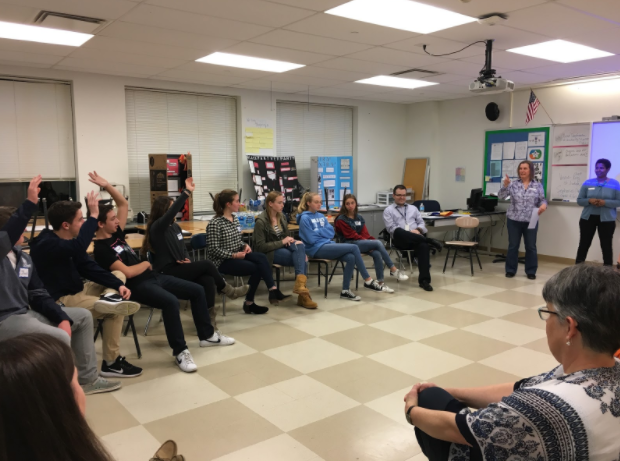By: Amelia Brown ’18
Not many things can incite the level of joy in students that the prospect of missing class can. Snow days, early dismissals, delays and, yes, even assemblies, send a rush of satisfaction and relaxation through our teenage minds. The Anti-Defamation League (ADL) sponsored assembly, Truth About Hate, with its glorious three-period time slot, was no different.
Yet for me, the excitement faded maybe halfway through guest speaker Frank Meeink’s speech. For some of the juniors and sophomores I talked to after, their interest didn’t even stretch past being yelled at to file into the seats in the front.
Now, Meeink’s story is very interesting and I know we were lucky to have had him speak to us, but his public speaking skills were not so great. This lead to him unfortunately going way over his time limit and rushing through the end of his story. You would think that that wouldn’t be bad since, as I said before, I zoned out halfway through. But I was left pretty uncomfortable when he ended, as I wasn’t quite sure how he got from a swastika-tattooed skinhead fresh out of jail, to a championship-winning hockey coach standing on our stage. His website says his book is “The story of Frank’s downfall and redemption.” I felt like we heard too much of the downfall and not enough of the redemption.
I understand that obviously the speaking portion went over the time allotted, and the school couldn’t let us miss the entire day for this assembly, but adapting to the situation could easily have been done better than just rushing the speech and the last open mic speakers. For instance, the student and two adult presenters, Michele and Anne-Marie, took way longer than necessary explaining the pyramid of hate. I had flashbacks of learning the exact same thing in eighth grade social studies, and their stretching it all the way up to genocide was too much. I see how one level does lead to the next, but in the context of high school, saying jokes lead to genocide discredited their whole point. As this part was before the speaker, they couldn’t have known to make it shorter to make up for time, but going through it more quickly next time will help keep more people paying attention much longer.
All that said, this assembly was still very important and well done. The open microphone portion, where students wishing to share their own stories of hate or discrimination or bullying, was great. I admit that when I heard the concept I didn’t think anyone would go up and speak in front of 900 of their peers. I was amazed and proud that so many did; yet also saddened that those students, along with others who I’m sure did not/were not allowed to come forward to speak, had stories of hate at Staples. But I guess that was the point. I cannot imagine a better way to build empathy, something Meeink stressed as the way to leave hate behind, than the open microphone session for sharing personal experiences.
Overall, the assembly was a huge improvement over the short one earlier in the year, which basically just said, “be nice.” This one prompted a real discussion about hate in our school that actually made an impact on students. Even though the execution may need to be sorted out for the subsequent years, it’s a huge step towards improving the climate of our school.














































